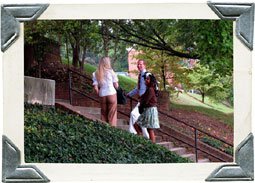Curry School of Education: A Fieldwork-Filled, Five-Year, Dual-Degree Program
A triple threat of training: academics, teaching, and technology.

The Universityof Virginia'sCurry Schoolof Education,featuring a five-year dual-degreeprogram combiningextensive subject-area knowledge, fieldwork,and pedagogy, "ranks among the topten education colleges by any measure."
That's the view of Barnett Berry, founder ofthe independent Center for Teaching Quality, inHillsborough, North Carolina. Curry has drawnsimilar accolades since revamping its four-yearteacher-training program in 1986 and adding a fifthyear leading to a master's degree.
A program hallmark is its close collaboration withthe UVA's College of Arts and Sciences: Each studentcross-trains in, and has an adviser from, both colleges. "Weput an emphasis on connecting knowledge in the contentarea with practice in the field," says Dean Bob Pianta.
Curry's prospective teachers earn their undergraduatedegrees in the liberal arts or sciences. In their second year(UVA eschews such labels as freshman or sophomore), most studentsenter the teaching sequence, observing in classrooms and otherschool settings. Third-year students focus on individual learners, tutoringchildren one-on-one. Fourth-year students complete coursework for theirmajors while studying and using whole-classroom management, instruction,and assessment techniques. Fifth-year students teach the entire fall semester,completing coursework and an education-research project in the spring.
The two colleges share a $5 million Teachersfor a NewEra grant, funded by the Carnegie Corporation ofNew York and the Ford and Annenberg foundations, to strengthen teacher education and elevate the profession. Cooperation is not only "helping the education school produce more effectiveteachers but has also raised the College of Arts andSciences's estimationof teaching," says Berry,who has researched the teamworkextensively. "That's an unintendedbut very powerful consequence."
Classes incorporate instructionon how to use theInternet, graphing calculators,PowerPoint, and othertechnology. "We try to get ourpreservice teachers to look at conceptsnumerically, algebraically, graphically,and visually, because it gives them differentinsights and understanding," says Joe Garofalo,who codirects Curry's Center for Technology andTeacher Education. The faculty push dynamic representations -- phases of the moon or commemorations of CivilWar battles that move as data changes -- citing studies on howvisualization tools improve learning. Curry also uses interactivevideo training (a homegrown system called CaseNEX) based on casestudies to teach problem solving.
Critics have raised concerns about the practicality ofspending the time and money on a fifth yearwhen many schools face teacher shortagesand when added tuition could deter studentswith limited finances, including some who might relate wellto kids from lower-income homes. In addition, about four out offive Curry teacher trainees are white women. Pianta acknowledgesthis fact, and agrees there's a need to diversify.
Still, Stewart D. Roberson, superintendent of Virginia's Hanover CountyPublic Schools and past president of the Urban Superintendents Associationof America, vouches for Curry grads teaching in his district of nearly 20,000students north of Richmond. Though Roberson (full disclosure: a Currygrad himself) has hired teachers from across the nation and theworld, he believes Curry graduates "set the goldstandard."
Vital Stats
- Location: Charlottesville, Virginia
- Degrees conferred: Five-year combined bachelor's and master's, or two-year master's
- Annual graduating class: 173 in 2006-07
- Time in the field: 4 semesters
- Highlights:
- Five-year combined bachelor's and master's program
- Student has one adviser in the College of Arts and Sciences and another in education
- Fifth-year research project
- Strong technology integration